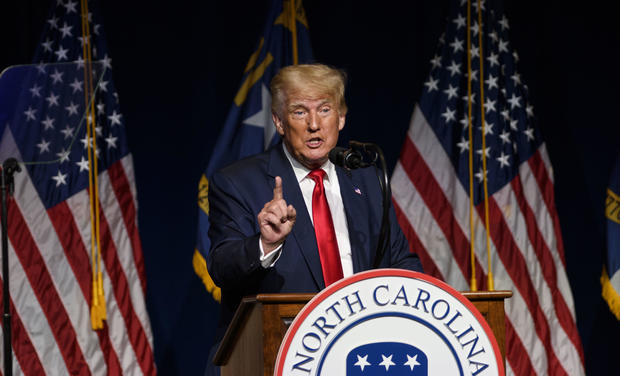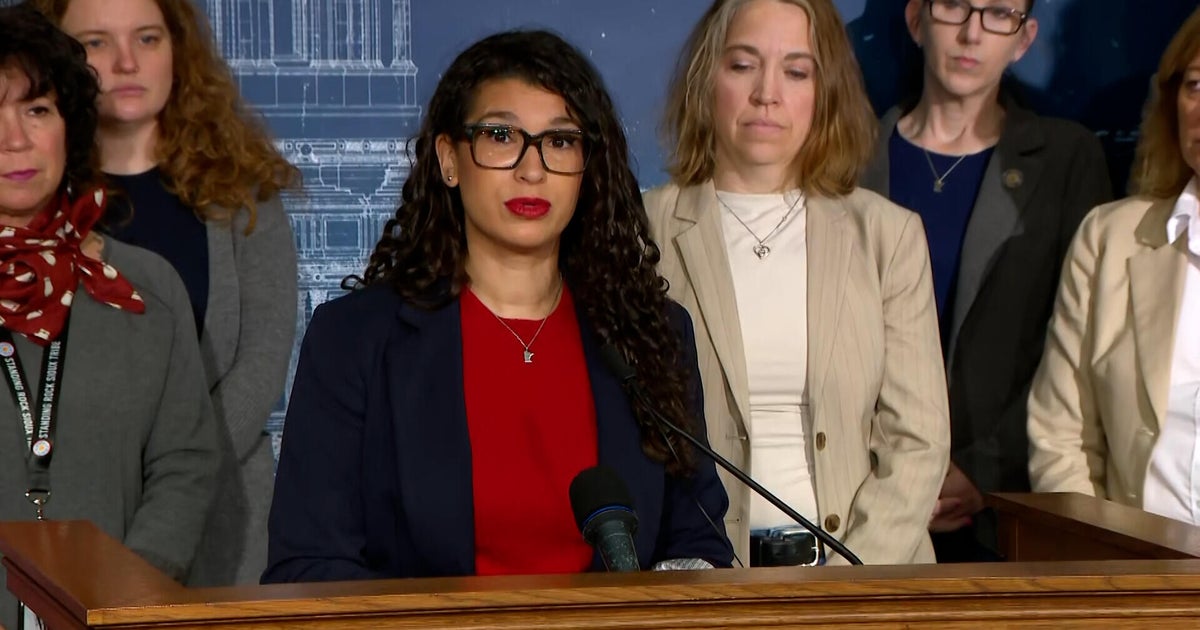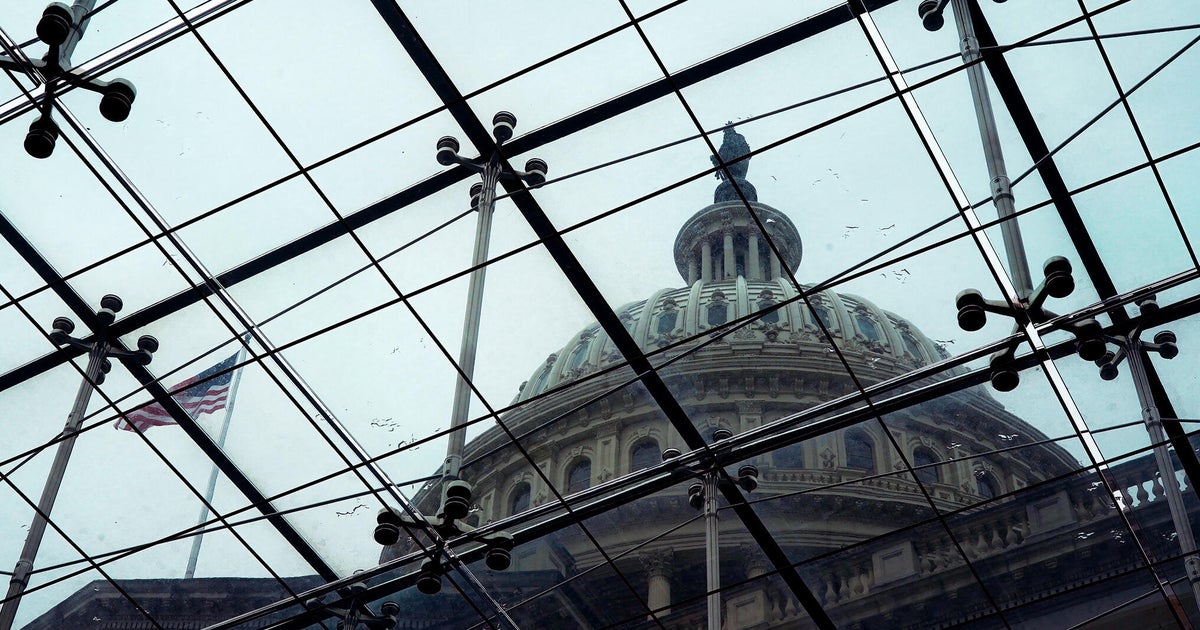Trump returns to political stage with speech at North Carolina GOP convention
Former President Donald Trump returned to the political stage with a speech at the North Carolina Republican Convention on Saturday, solidifying his continued symbolic leadership of the party despite his repeated falsehoods about the 2020 election, and allowing him to exert influence amid an ongoing social media ban.
Mr. Trump's second public speech comes after a tumultuous three months for his party. He ripped President Biden's first several months in office, touted his own accomplishments in the White House and repeated false claims that the 2020 election was a "hoax." He teased that 2024 is a year that he is "very much" looking forward too, but placed his focus on the midterm elections.
"The survival of America depends upon our ability to elect Republicans at every level, starting with the midterms next year," Mr. Trump said.
Mr. Trump attacked Mr. Biden's record on immigration, the economy and foreign policy for a substantial portion of the speech, saying "our country is being destroyed before our very own eyes." The former president also highlighted his administration's work on the vaccine, asserting that is what set up the recovery that's currently taking place.
Mr. Trump also seized on renewed interest in pursuing the origins of COVID-19, with some questioning whether the virus originated at a lab in Wuhan, China. He mocked Dr. Anthony Fauci, Mr. Biden's chief medical adviser, for dismissing that theory in the past. Mr. Trump said he got along with Fauci, but criticized Fauci's track record.
"He's not a great doctor, but he's a hell of a promoter," Mr. Trump said. "He likes television more than any politician in this room, and they like television, but he's been wrong on almost every issue and he was wrong Wuhan and the lab also."
The crowd erupted when Mr. Trump called on China to pay the rest of the world for damage caused by the virus.
"All nations should work together to present China a bill for a minimum of $10 trillion to compensate for the damage they caused," Mr. Trump said. "We should all declare with one unified voice that China must pay."
Mr. Trump has released numerous statements in recent weeks about the November election and the ongoing audit in Arizona, indicating that the 2020 election is still very much on his mind. He turned to elections towards the end of his remarks Saturday, and once again falsely stated that the 2020 election was a "hoax" and the "crime of the century." Mr. Trump praised Republican lawmakers who have been working in state capitals around the country to overhaul their voting laws in the wake of that election.
"I'm not the one trying to undermine American democracy, I'm the one that's trying to save it," Mr. Trump said. The comment received a loud round of applause.
Mr. Trump and his allies lost more than 60 court cases seeking to overturn the results after the November election and his own attorney general said there was no evidence of fraud at a level that "could have effected a different outcome in the election." It was the "most secure election in American history," said the U.S. Cybersecurity and Infrastructure Security Agency.
As the former president contemplates his political future, prosecutors in the New York attorney general's office and the Manhattan district attorney have been investigating Mr. Trump's business. The former president dismissed those probes on Saturday night as part of an ongoing witch hunt.
"They're in search of a crime. It's a fishing expedition," Mr. Trump said. "They failed in Washington. They failed all over the place. Between the impeachment hoax number one, impeachment hoax number two. All of these investigations. 'Ah, s***, we failed. Let's send it to the radical left prosecutors in New York. Maybe they can have more luck.'"
Even though Republicans lost control of the House, Senate and White House under Mr. Trump, he continues to have a remarkable hold on the party. A recent CBS News poll found that 66% of Republicans said it is important for Republicans to be loyal to Mr. Trump. A Reuters/Ipsos poll published May 21 showed just 28% of Republicans think Mr. Trump should not run for president again in 2024.
Mr. Trump won North Carolina in 2016 and 2020 and the state will be one of the top Senate battlegrounds in 2022 with an open race to replace retiring Republican Senator Richard Burr. Mr. Trump's daughter-in-law, Lara Trump, had been considering jumping into the race, but she announced Saturday night that she will not be running.
"Because of my two kids who are very young, 1 and 3, Carolina and Luke, it is going to be very hard for me to enter this Senate race right now. But I am saying no for now, not no forever," Lara Trump said. Following her announcement, Mr. Trump endorsed Congressman Ted Budd in the GOP primary.
Mr. Trump's continued grip on the GOP has played out not just on the campaign trail, but also in the halls of Congress.
House Republicans ousted Congresswoman Liz Cheney from her leadership position in May because of her frequent criticism of Mr. Trump, her refusal to promote false claims about the election and her insistence that the party should not whitewash the January 6 attack on the U.S. Capitol by a violent mob of Trump supporters. Cheney was replaced as conference chair by Congresswoman Elise Stefanik, a staunch Trump ally.
A few weeks after Cheney's unceremonious removal, Senate Republicans blocked a bill that would have created a bipartisan, independent commission to investigate the January 6 attack. Most Republicans in Congress, including House Minority Leader Kevin McCarthy and Senate Minority Leader Mitch McConnell, have argued that the country should move forward from the attack.
Rioters threatened the lives of lawmakers and former Vice President Mike Pence during the assault, which resulted in the deaths of five people, and more than 140 law enforcement officials were injured. Pence acknowledged in a speech on Thursday that he would "never see eye-to-eye" with Mr. Trump about the attack.
The president, meanwhile, remains banned from Facebook and Twitter. Facebook announced Friday that it is barring Mr. Trump from its platform for at least two years, after finding that his posts on January 6 stoked violence and posed a risk to public safety. The two-year ban began on January 7, when Mr. Trump was initially suspended from Facebook, and it will keep him off the platform through the 2022 midterm elections.
"I'm not too interested in that," Mr. Trump said of returning to Facebook.




